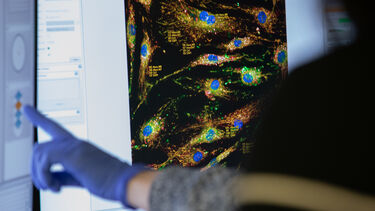MND Awareness Day - 21 June
Global MND Awareness Day is where the MND community comes together to honour everyone affected by motor neuron disease.
We are adding our voice to the call for better care, research, and greater support for everyone affected by MND, and highlighting how we’re playing a part here at Sheffield.
We encourage you to reach out and share the message across your networks in support of the campaign to accelerate the search for a cure.
What is MND?
MND, also known as amyotrophic lateral sclerosis (ALS), is a fatal disease that affects the motor nerves, known as motor neurons, in the brain and spinal cord.
The progressive disease causes the nerves that take signals from the brain to the muscles to stop working. This leads to muscle weakness, stiffness and paralysis that worsens over time, impacting upon the patient’s ability to walk, talk, eat and breathe.
Few patients survive beyond five years after being diagnosed, and most current treatments only modestly increase life expectancy.
MND is a group of diseases with multiple causes, rather than a single root cause, which is part of the reason it is so difficult to treat.
Sheffield’s MND expertise
We are internationally renowned for world-class neurodegenerative research. The Sheffield Institute for Translational Neuroscience (SITraN) unites researchers from across a range of neurodegenerative specialisms. By working together under one roof, collaborating and sharing discoveries from across their fields, it’s a place where independent thinking meets a shared ambition to ask bold questions, push boundaries, and make a difference.
SITraN has been widely recognised for its exceptional research since it was formed 15 years ago, and has set out its plan to grow, setting the stage for greater progress.
“The institute marks a significant milestone in our journey towards an effective treatment for people living with MND,” said Professor McDermott.
We are looking forward to driving forward our work to discover new treatment strategies and ultimately new drugs that stop MND in its tracks.
Professor McDermott
Professor of Translational Neurology at the University of Sheffield and Co-Director of the UK MND Research Institute
How we’re addressing MND
There’s no simple answer to MND, which is why we’re approaching it through several research strands:
Identifying the causes of MND
Spotting protein abnormalities
We’ve developed a new imaging technique to identify a protein abnormality in MND, helping scientists better understand the changes in the brain that lead to MND and could help with the development of new treatments.
New imaging technique uncovers protein abnormality in motor neurone disease
Increased genetic risk of MND from strenuous exercise
For specific individuals who have a particular predisposing genetic profile, we found a causal relationship between frequent strenuous exercise and MND, with high intensity physical activity contributing to motor neurone injury.
Finding treatments for MND
University spinout developing breakthrough therapies for underlying causes of MND
The University and its spinout company Crucible Therapeutics secure a ÂŁ2.3 million Innovate UK Biomedical Catalyst award to develop breakthrough siRNA therapies that address underlying causes of MND.
New treatment option being evaluated for patients in early stages of MND
A medical trial provided evidence that modifying the immune system could be an effective strategy for altering MND progression, after an investigation saw the risk of death at the end of the study reduced by over 40 per cent for a subset of the participants.
Landmark MIROCALS clinical trial provides new insight into treatment of MND
Living longer with MND
Sean Davies is living with MND. He’s currently receiving tofersen injections - an MND drug developed in part at Sheffield - that is not only helping to slow the progress of his MND symptoms, but is also offering hope for MND patients and future generations who may also develop the disease.
Improving the experience of living with MND
Supporting patient independence in early MND
Collaborating with patients, we developed a support collar that helps MND patients to go about their day-to-day lives more easily - eating, drinking and reading comfortably, knowing that their head and neck are fully supported as muscle strength declines.
Complementary psychological therapy improving quality of life
Incorporating acceptance and commitment therapy (ACT) alongside other forms of MND care and treatment was found to significantly improve quality of life of MND patients, with the magnitude of change suggesting a clinically meaningful benefit.
New psychological therapy shows promise in improving quality of life for people living with MND
Empowering patients to access and participate in MND clinical trials
We co-designed a digital platform to make it easier and quicker for people across the UK with MND to take part in vital scientific studies by removing some of the physical barriers, making it possible for more patients to get involved in research about the illness affecting them.
People living with MND given a voice in research with new digital tool
What you can do
Finding treatments for MND is not a quick process, but together we can accelerate progress. To support this, you can:
- Share these stories and discoveries to build awareness and provide hope and support to people affected by MND
- Use your networks to make connections and encourage collaborations across the neuroscience community and beyond
- Make a donation to fund ongoing and future MND research here at Sheffield


